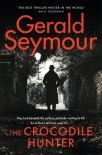The Crocodile Hunter by Gerald Seymour (english novels to improve english txt) 📗

- Author: Gerald Seymour
Book online «The Crocodile Hunter by Gerald Seymour (english novels to improve english txt) 📗». Author Gerald Seymour
He had been cut out of the choir, had known it was coming, and had known that his voice had suffered the first indications of what one of the adult choir members had called “imperfections”. Had noticed that old Fergie had begun to take a keener interest in him, and had started, not often, to wince when Cammy hit certain notes.
They were all condemned – Cammy as much as any of the kids he was listening to now, in their white and purple, singing to the rafters far above. Put crudely, “because their balls are going to drop”, their voices would deepen. Most would stay on at the college because they had “made a good impression”, had shown promise at cricket or rugger, or had taken to a musical instrument, or were doing well in the classroom. Did not harbour what old Fergie called the “rebel streak”. It was the way of the estate, for the young’uns, that retaliation should be got in first. In two years, the college had not taken the estate out of Cameron Jilkes. At the last evensong he was no longer allocated a place in the front row and nearest the choirmaster. His mum was not there.
It was expected that he would be leaving both the choir and the college. Surplus to requirements and considered “unsuitable material”. Did not have to be done with pain and angst; rough edges would have been planed smooth and scholarship money made available.
They sang Nunc dimittis. His lips moved with the words, so well remembered . . . Could remember the day trip, a week before decisions were made for the future of those whose voices were breaking, “changing”.
“We went by coach for lunch at Sandwich, a pretty little place, and then on to the Roman fortifications at Richborough.”
The pipe smoke filled the room, then was wafted towards an open window. Tristram would have prompted had it been necessary; Izzy had shorthand and took a note.
“I think I was quite popular. They called me ‘old Fergie’. I was temporary, a stand-in, just there for a few months. My difficulty came when some of the voices were no longer fit for purpose. I was in the front line for passing on the bad news: and worse news, in a very few cases, was when we were parting company lock, stock and barrel. He knew he was going to take the bullet. I could see a hardening of attitude, a different child, and we are talking of a thirteen-year-old – as if a mask was removed, left the real personality bare.”
The former choirmaster lived in a bedsit in a decaying post-war block. The nobility of the great cathedral down the road was far away. He was slouched on a faded settee and Tristram and Izzy were sitting on upright chairs.
“It is an amazing ruin. Probably the best example of the power of Rome’s occupation of England. Huge high walls and all still in extraordinary condition, and clear signs of the gatehouse, home for two centuries to the Second Augustinian Legion. Wonderful place. All the boys were spellbound by it, the size, its authority. Except one child. That was Cameron. I was singing its praises. He challenged me. One thing to disagree, another to challenge. Perhaps my language was florid, I’d talked up Roman power. He called out from his usual place at the back of any group, called my remarks, ‘Rubbish’. Pushing it a bit, you could say. I told him firmly, slapping him down, these ruins are remarkable, should be admired. He said, voice cracking, gruffness setting in, ‘That’s rubbish. Look around you. All collapsed. Thought they’d last for ever. Just a heap of stones.’ They had had a dose a week or so before of Shelley. This child was no fool. Had made the connection. Quoted back at me: ‘My name is Ozymandias, king of kings, Look on my works ye mighty and despair . . .’ ”
Tristram recited, “Nothing beside remains. Round the decay Of that colossal wreck, boundless and bare. Did it at school.”
Izzy said. “The lone and level sands stretch far away. Big poetry isn’t just for posh kids. He had a point.”
“It was a calculated piece of impertinence. What I’m saying is that Cameron had set his face against anything that represented power, discipline, tradition. The choir was acceptable to him because he was its star; not for the glory of God or the beauty of the hymns and responses. He was the centre of attention . . . A week later, after his situation had been thrashed around by the staff at the college, and the decision had been taken, it was my job to break the news to him. ‘Sorry, Cameron, but we don’t think going on here is in your best interests. We’ll do all we can to find you another school, more suitable for your needs.’ No tears, no explosion of bad language, just a deadening of the eyes. I had my hand out, to shake his, which I thought the correct gesture. I was ignored. He turned on his





Comments (0)